-
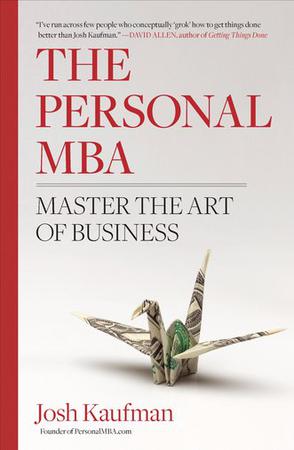
The Personal MBA
A world-class business education in a single volume. Getting an MBA is an expensive choice-one almost impossible to justify regardless of the state of the economy. Even the elite schools like Harvard and Wharton offer outdated, assembly-line programs that teach you more about PowerPoint presentations and unnecessary financial models than what it takes to run a real business. You can get better results (and save hundreds of thousands of dollars) by skipping B-school altogether. Josh Kaufman founded PersonalMBA.com as an alternative to the business school boondoggle. His blog has introduced hundreds of thousands of readers to the best business books and most powerful business concepts of all time. Now, he shares the essentials of entrepreneurship, marketing, sales, negotiation, operations, productivity, systems design, and much more, in one comprehensive volume. The Personal MBA distills the most valuable business lessons into simple, memorable mental models that can be applied to real-world challenges. The Personal MBA explains concepts such as: *The Iron Law of the Market: Why every business is limited by the size and quality of the market it attempts to serve-and how to find large, hungry markets. *The 12 Forms of Value: Products and services are only two of the twelve ways you can create value for your customers. *The Pricing Uncertainty Principle: All prices are malleable. Raising your prices is the best way to dramatically increase profitability-if you know how to support the price you're asking. *4 Methods to Increase Revenue: There are only four ways a business can bring in more money. Do you know what they are? True leaders aren't made by business schools-they make themselves, seeking out the knowledge, skills, and experience they need to succeed. Read this book and you will learn the principles it takes most business professionals a lifetime of trial and error to master. -
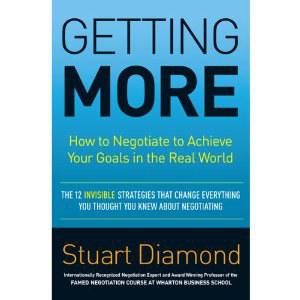
Getting More
Negotiation is part of every human encounter, and most of us do it badly. Whether dealing with family, a business or diplomacy, people often fail to meet their goals in every country and context. They focus on power and “win-win” instead of relationships and perceptions. They don’t find enough things to trade. They think others should be rational when they should be dealing with emotions. They get distracted from their goals. In this revolutionary book, leading negotiation practitioner and professor Stuart Diamond draws on the research and practice of 30,000 people he has taught and advised in 45 countries over two decades to outline specific, practical and better ways to deal with others. They range from country and corporate leaders to administrative assistants, lawyers, housewives, students and laborers. To this he adds his 40-year experience as an executive, Harvard-trained attorney and Pulitzer Prize winning journalist. Getting More is based on Professor Diamond’s award-winning negotiations course at The Wharton Business School, where it has been the most sought-after course by students for 13 years. It contains a powerful toolkit that can be used by anyone in any situation: with kids and jobs, travel and shopping, business, politics, relationships, cultures, partners and competitors. The advice is addressed through the insightful stories of hundreds of people who have used Diamond’s tools with great success. A 20% savings on an item already on sale. An extra $300 million profit in a business. A woman from India getting out of her own arranged marriage. A 4 year old willingly brushing his teeth and going to bed. Conventional wisdom is challenged on almost every page. Instead of “win-win,” it sometimes makes more sense lose today to get more tomorrow. The use of power, Diamond cautions, too often causes retaliation, harms relationships and costs credibility. Walking out is almost never as good as understanding the other person’s perceptions and fixing the problem. Not everything is about money; intangibles such as valuing others will often get you much more in return. Even the hardest bargainers can be tamed by using their own public standards against them. The key to getting more is finding the right tools for each situation; being more flexible, and better understanding the other party. These strategies are invisible, until you learn them. Once you see them, they will always be there to help you get more . -
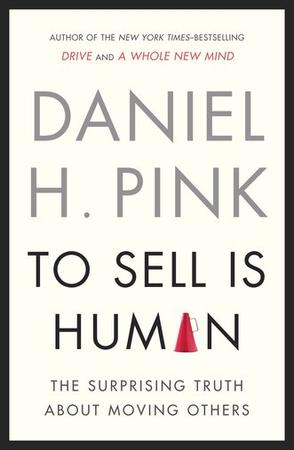
To Sell Is Human
-

工作中的博弈论GAME THEORY AT WORK
Easy-to-follow strategies for using game theory to grab the upper hand in every business battle game theory - the study of how competitors act, react, and interact in the strategic pursuit of their own self-interest - has become an essential competitive tool in today's business arena. "Game Theory at Work" provides examples of how businesspeople can use this time-proven approach to successfully meet competitive challenges and, more often than not, claim the upper ground in each battle before it begins. "Game Theory at Work" steers clear of the opaque mathematics and pedagogy that so often hamper practitioners of game theory, relying instead on lively case studies and examples to illustrate its remarkable methods in action.Complex yet comprehensible, it provides you with: methods for applying game theory to every facet of business; strategies for instantly improving your position in virtually any negotiation. Game theory techniques to increase the output and value of each employee. At its essence, business is a game, albeit a profoundly serious game that must always be played to win. "Game Theory at Work" is the first plain-English examination of the use of game theory in business. Let it provide you with the intellectual tools you need to instantly understand every game you're playing, use that knowledge to your advantage, and consistently maximize your finish-line payoff. '"Game Theory at Work" won't teach you about power-chants, discuss the importance of balancing work and family, or inspire you to become a more caring leader. This book will instead help you out - strategize, or at least keep up with, competitors inside and outside your company' - From the Introduction.Like Sun Tzu's timeless "The Art of War", "Game Theory at Work" is about knowing your adversary as well as yourself. It is also about using that knowledge to prepare yourself for victory. But above all, this one-of-a-kind book is about dramatically improving your strategic instincts and decision-making skills - and emerging victorious - in virtually any business encounter. Introduced by John von Neumann and Oskar Morgenstern in their 1944 book "Theory of Games and Economic Behavior", and further honed through the decades by thought leaders including Nobel Prize winner John Nash, game theory analyzes strategic interactions in which the outcomes of various choices depend on the choices of others."Game Theory at Work" applies this innovative tool to the world of business, and provides a step-by-step framework for using game theory to improve your on-the-job success in areas including: negotiating; managing; pricing; positioning; establishing; and strategic alliances. More than that, however, "Game Theory at Work" is a one-of-a-kind tool to battle the high costs of indecision. It shows you how to enter any encounter confident in how others will act, and then use game theory to base your strategies and actions on this knowledge. Case studies, puzzles, and, yes, games demonstrate why unexpected and often paradoxical results are the norm when humans compete, and help you use this fact to your advantage. And, chapter-ending lessons highlight essential rules learned...All in a book that is both absorbing and entertaining, designed to improve your business instincts without requiring the use of needless mathematics or theoretical mumbo-jumbo. Everything in life is competitive in one way or another, and game theory has revolutionized the art and science of what to look for-and how to act-when engaged in competition. "Game Theory at Work" studies the use of game theory in today's hard-fought business arena, and shows you how to use it to gain maximum advantage in every professional encounter, whatever your role in that encounter. -
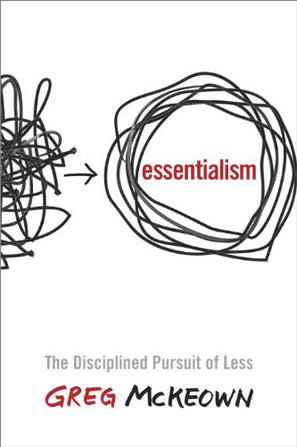
Essentialism
-
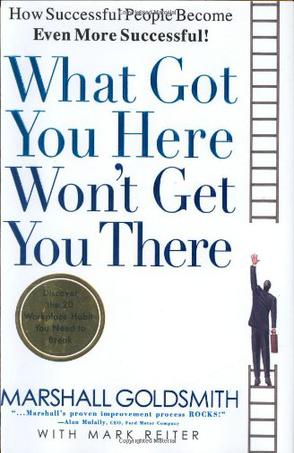
What Got You Here Won't Get You There
America’s most sought-after executive coach shows how to climb the last few rungs of the ladder The corporate world is filled with executives, men and women who have worked hard for years to reach the upper levels of management. They’re intelligent, skilled, and even charismatic. But only a handful of them will ever reach the pinnacle -- and as executive coach Marshall Goldsmith shows in this book, subtle nuances make all the difference. These are small "transactional flaws" performed by one person against another (as simple as not saying thank you enough), which lead to negative perceptions that can hold any executive back. Using Goldsmith’s straightforward, jargonfree advice, it’s amazingly easy behavior to change. Executives who hire Goldsmith for one-on-one coaching pay $250,000 for the privilege. With this book, his help is available for 1/10,000th of the price.